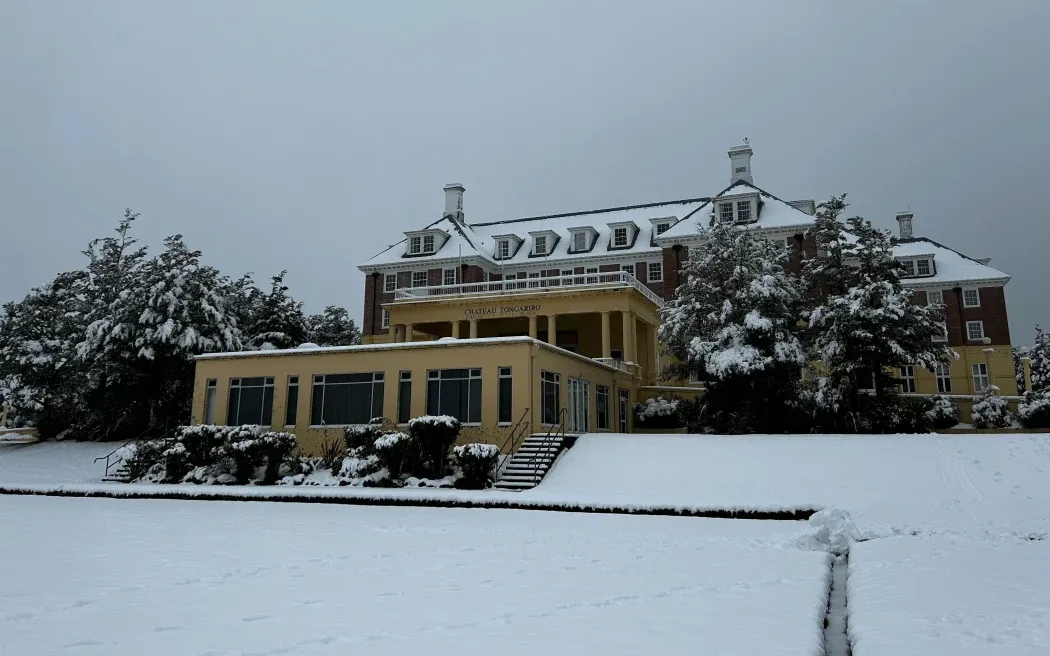A Department of Conservation (DOC) briefing paper has raised concerns about the financial viability of investing in the repair and maintenance of the historic Tongariro Chateau. The document, obtained through the Official Information Act, reveals that a significant Crown investment would be required to bring the chateau up to standard for re-leasing.
The actual costs associated with the repairs were heavily redacted from the document, but the DOC did provide some insight into the estimated expenses. According to the briefing paper, seismic strengthening and significant repairs would be necessary before an investor or operator could take on the business.
The paper warned that investing in the chateau would result in negative net value for the Crown under both a short-term occupational lease and a long-term lease. The costs associated with these options included:
• Repairs to hotel facilities, staff accommodation, and construction
• Project management costs and contingencies
These costs could be partially offset by lease revenue, but the paper emphasized that investing in the chateau would still result in financial losses for the Crown.
The DOC briefing also took into account the potential impact of climate change on ski operations, which could affect the commercial viability of the chateau. The document noted that the hotel previously employed 73 staff at peak operations and accounted for 30% of hotel room stock in the district.
The permanent or long-term closure of the chateau alongside uncertainty over the ski fields is likely to negatively impact the local economy. The DOC intended to engage with iwi, the local community, Heritage New Zealand, and the Ministry of Culture and Heritage to inform Cabinet on decisions about the long-term future of the building.
In its recommendations, the DOC briefing paper advised against proceeding with an expressions of interest process for private operators. Instead, it sought direction from Minister of Conservation Tama Potaka on next steps.
If the minister agreed not to proceed with the expressions of interest process, the DOC would prepare a Cabinet paper by October 2024. If not, the department would complete the process and report back on its outcome in early October.
Background Information
The DOC reminded the minister that it was costing the department $1.8 million to maintain the abandoned building to a basic level in 2023/2024 and had budgeted $2.1 million in 2024/2025 for the same purpose. The briefing paper also provided advice on the cost of decommissioning the building.
The document did not consider the wider economic benefits for the region of a Crown investment in the chateau or its heritage value to New Zealand. However, it acknowledged that the hotel’s previous employment of 73 staff and its contribution to hotel room stock in the district made it an important part of the local community.
The Tongariro Chateau has a rich history and cultural significance, both locally and nationally. The DOC briefing paper recognized this and emphasized the importance of engaging with stakeholders to inform Cabinet on decisions about the long-term future of the building.
Investment Options
The DOC considered two main options for private operators:
1. Short-term occupational lease: This option would involve a temporary agreement between the Crown and a private operator, allowing them to take over the chateau’s operations for a specific period.
2. Long-term lease: This option would involve a longer-term agreement, with the private operator taking on more responsibility for the chateau’s maintenance and operation.
Both options came with significant costs, including seismic strengthening and repairs before an investor or operator could take on the business. The paper noted that these costs could be partially offset by lease revenue, but investing in the chateau would still result in financial losses for the Crown.
Conclusion
The DOC briefing paper has raised important concerns about the financial viability of investing in the repair and maintenance of the Tongariro Chateau. While the document did not consider the wider economic benefits for the region or its heritage value to New Zealand, it acknowledged the importance of engaging with stakeholders to inform Cabinet on decisions about the long-term future of the building.
The government’s decision on this matter will have significant implications for the local community and the broader tourism industry in New Zealand. It is essential that careful consideration is given to the potential consequences of any investment or maintenance plan, taking into account both financial and cultural considerations.

0 Comments